Module 9 Unit 1 He left school and began work at the age of twelve课件+内嵌音视频(外研版英语七年级下册)
文档属性
| 名称 | Module 9 Unit 1 He left school and began work at the age of twelve课件+内嵌音视频(外研版英语七年级下册) | 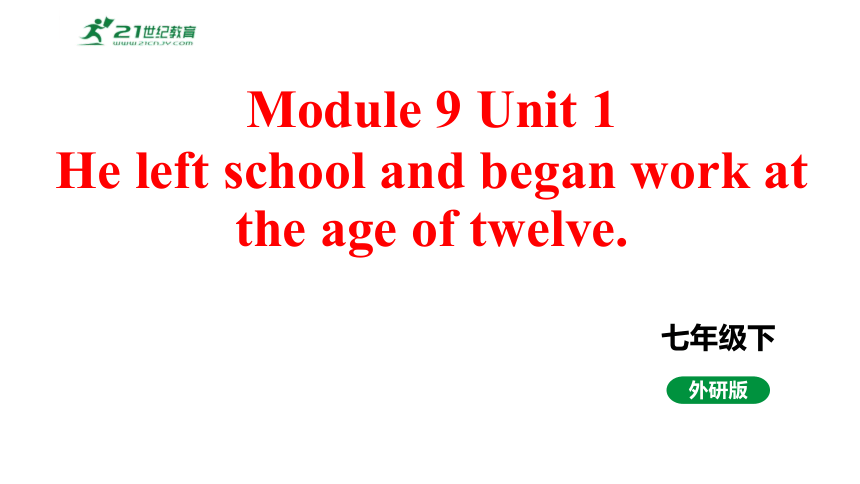 | |
| 格式 | pptx | ||
| 文件大小 | 66.3MB | ||
| 资源类型 | 试卷 | ||
| 版本资源 | 外研版 | ||
| 科目 | 英语 | ||
| 更新时间 | 2024-04-26 15:11:01 | ||
图片预览

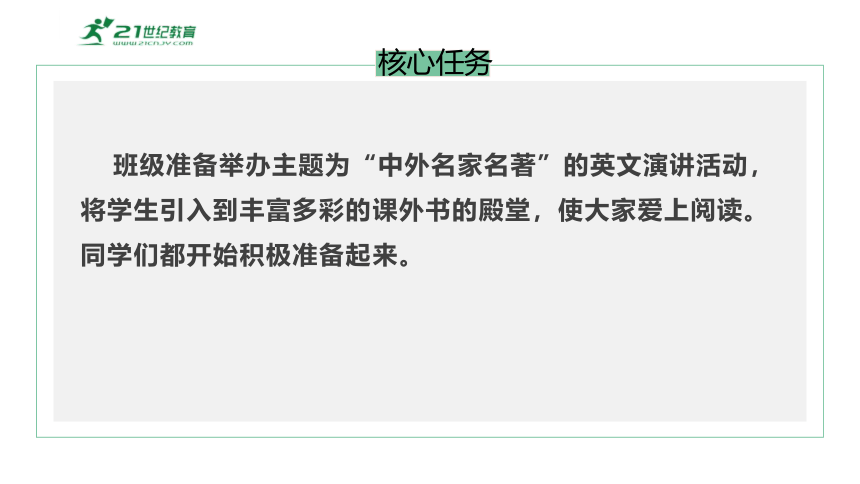
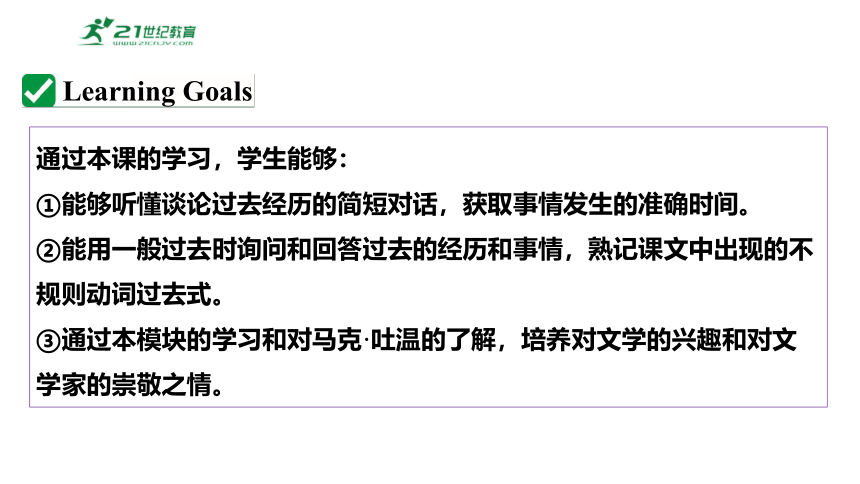
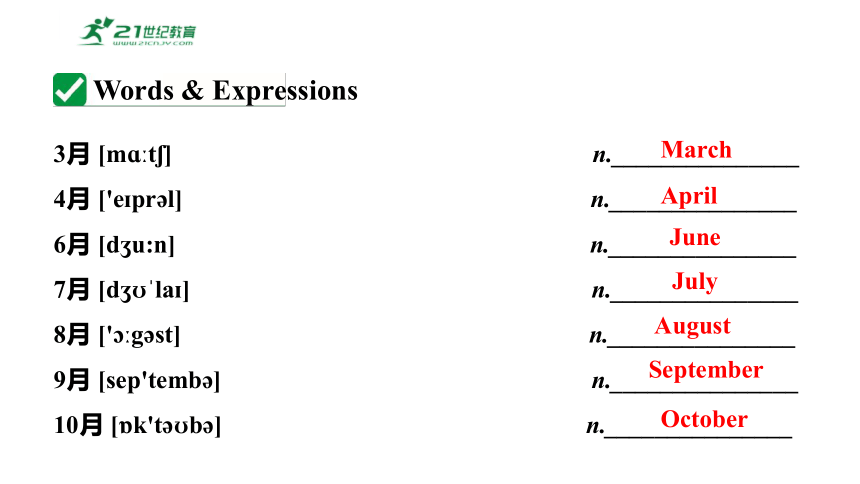

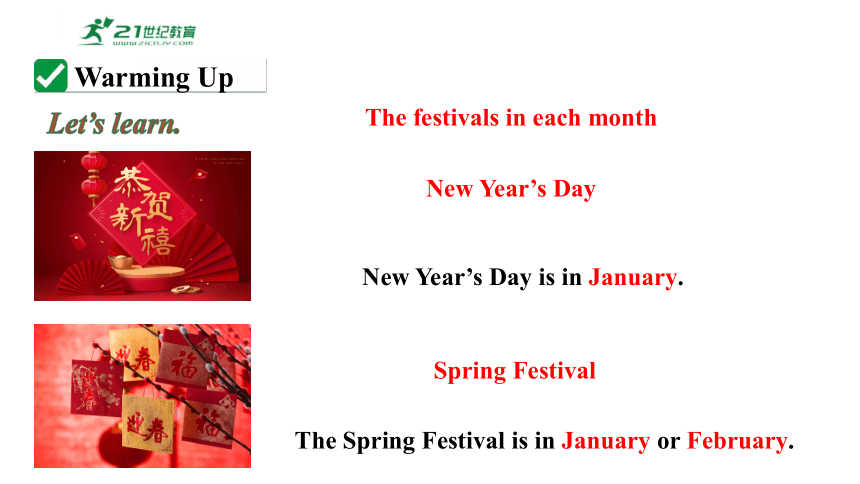
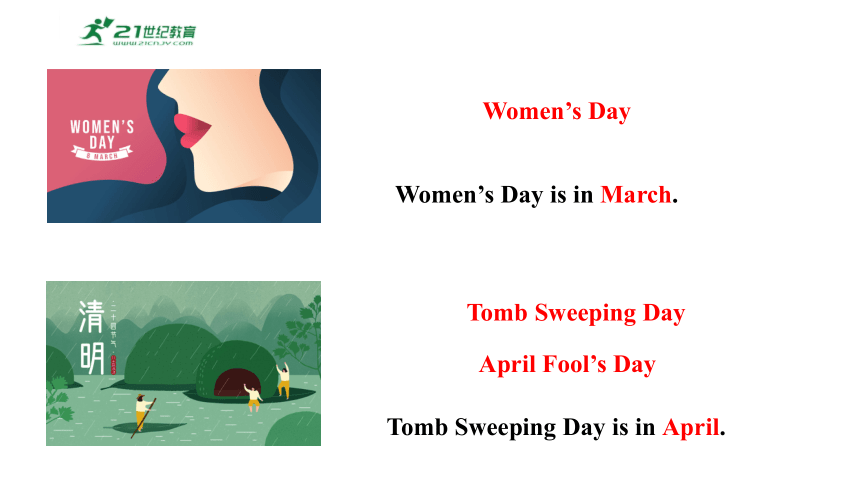
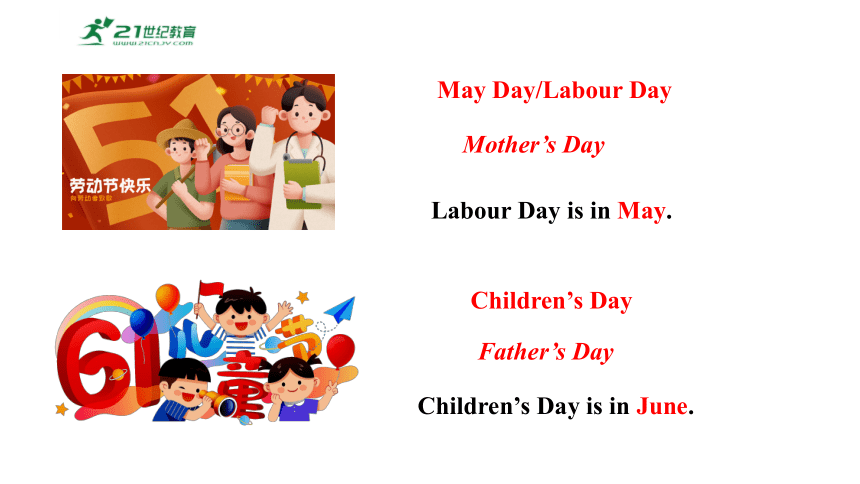

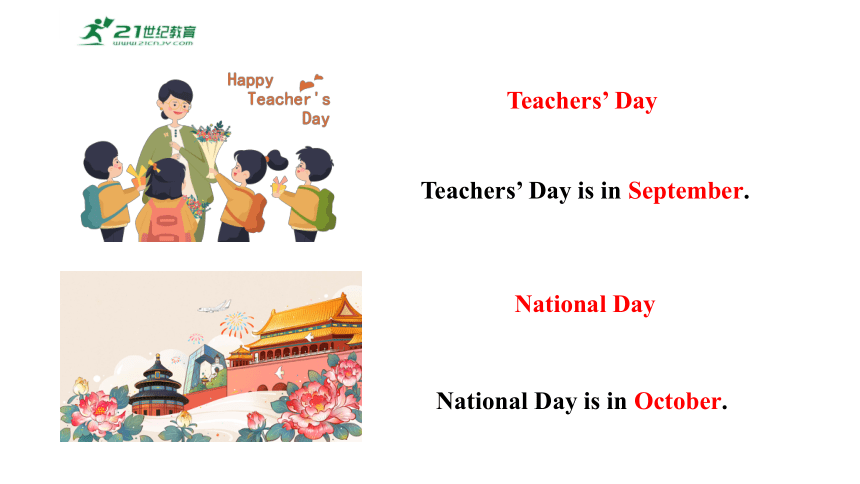
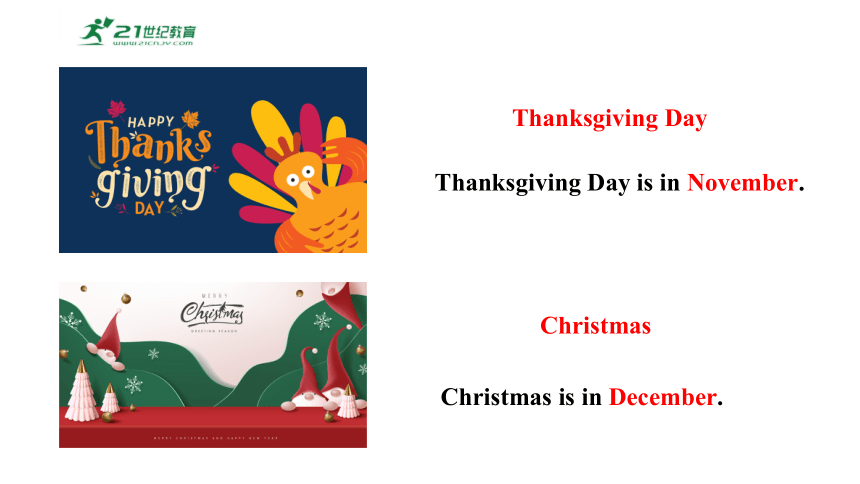
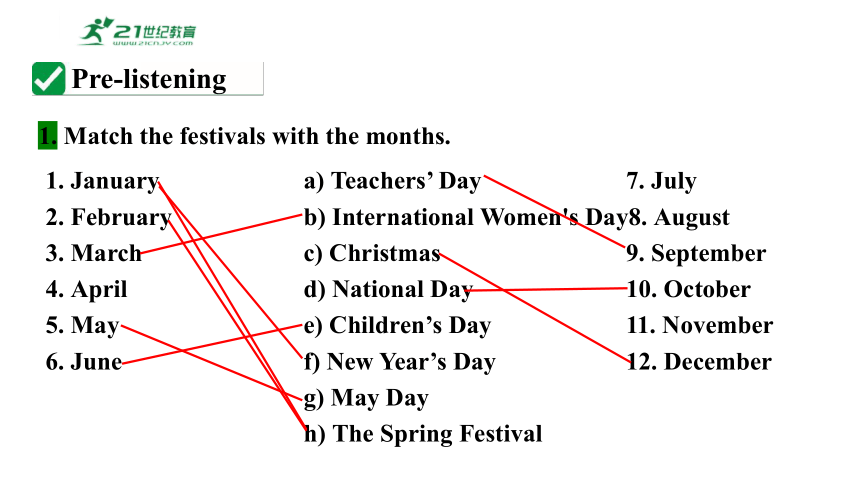
文档简介
(共39张PPT)
Module 9 Unit 1
He left school and began work at the age of twelve.
七年级下
外研版
班级准备举办主题为“中外名家名著”的英文演讲活动,将学生引入到丰富多彩的课外书的殿堂,使大家爱上阅读。同学们都开始积极准备起来。
核心任务
Learning Goals
通过本课的学习,学生能够:
①能够听懂谈论过去经历的简短对话,获取事情发生的准确时间。
②能用一般过去时询问和回答过去的经历和事情,熟记课文中出现的不规则动词过去式。
③通过本模块的学习和对马克·吐温的了解,培养对文学的兴趣和对文学家的崇敬之情。
Words & Expressions
3月 [mɑ t ] n._______________
4月 ['e pr l] n._______________
6月 [d u:n] n._______________
7月 [d la ] n._______________
8月 [' g st] n._______________
9月 [sep'temb ] n._______________
10月 [ k't b ] n._______________
March
April
June
July
August
September
October
11月 [n 'vemb ] n._______________
12月 [d 'semb ] n._______________
作家 ['ra t ] n._______________
真实的;真正的 [r l] adj._______________
报纸 ['nju z pe p ] n._______________
准确的;确切的 [ g'z kt] adj._______________
日期 [de t] n._______________
成为 [b 'k m] v._______________
November
December
writer
real
newspaper
exact
date
become
Warming Up
Let’s learn.
Spring Festival
The Spring Festival is in January or February.
New Year’s Day
New Year’s Day is in January.
The festivals in each month
April Fool’s Day
Tomb Sweeping Day is in April.
Women’s Day
Women’s Day is in March.
Tomb Sweeping Day
Children’s Day
Children’s Day is in June.
Father’s Day
May Day/Labour Day
Labour Day is in May.
Mother’s Day
Army Day
Army Day is in August.
Party’s Day
Party’s Day is in July.
National Day
National Day is in October.
Teachers’ Day
Teachers’ Day is in September.
Thanksgiving Day
Thanksgiving Day is in November.
Christmas
Christmas is in December.
1. Match the festivals with the months.
1. January a) Teachers’ Day 7. July
2. February b) International Women's Day8. August
3. March c) Christmas 9. September
4. April d) National Day 10. October
5. May e) Children’s Day 11. November
6. June f) New Year’s Day 12. December
g) May Day
h) The Spring Festival
Pre-listening
Now talk about when the festivals are.
The Spring Festival is in January or February.
2. Listen and choose the correct answer.
1. Betty’s grandfather’s life was/wasn’t different from Betty’s.
2. Betty’s grandfather was born in April 1935/1955.
3. Betty’s grandfather went to America/England in October/November 1941.
Betty: What was life like when you were young, Grandpa
Grandfather: It was very different!
Betty: When were you born, Grandpa
Grandfather: I was born in April 1935.
Betty: Were you born in America
Grandfather: No, I wasn’t. I was born in England.
Betty: When did you come to America
Grandfather: We came to America in October 1941 when I was six years old.
Tapescript
While-listening
3. Watch the video carefully and complete the table about Mark Twain.
托尼也要参加活动,他准备介绍的是美国著名作家马克·吐温和他的名作《汤姆·索亚历险记》,此时正在收集资料。
Now complete the table about Mark Twain.
Time Facts
In 1835
At the age of twelve
In the 1860s
born in Missouri
left school and began work
took the name Mark Twain and became very famous
Listen again and check the sentences.
1. Tom Sawyer is written by the famous English writer, Mark Twain.
2. Mark Twain left school and began work in his childhood.
3. Mark Twain wrote for a newspaper and got work on a boat.
4. Mark Twain became very famous in the 1960s and began his stories.
5. Mark Twain went to Europe and China.
√
×
√
×
×
Betty: What are you reading
Tony: Tom Sawyer, by the famous American writer, Mark Twain. I’m
writing about him for my English class.
Betty: I read Tom Sawyer. Very good! Hey, we can find out about him on the Internet.①
Tony: Yes! … OK. Look at this! His real name was Samuel Clemens and he was born in 1835 in Missouri. He left school and began work at the age of twelve.
Betty: What did he do
查明;弄清
在十二岁的时候
Tony: He wrote for a newspaper. Later he got work on a boat.
Betty: Did he stay in Missouri
Tony: No, he went to New York, and other cities.
Betty: When did he begin his stories ②
Tony: I don’t know the exact date. But he took the name Mark Twain and became very famous in the 1860s. He went to Europe as well. But he didn’t come to China.
Betty: Yes, I knew that. Enjoy the book.
Tony: Yes, it’s good.
在19世纪60年代
Everyday English
Look at this!
Enjoy the book.
4. Find the past form of the verbs in the conversation.
be become begin do get go
know leave read take write
be—was/were become—became begin—began
do—did get—got go—went
know—knew leave—left read—read
take—took write—wrote
Learning to learn
Some verbs have an irregular past simple, e. g. , “go—went”. Remember to make notes of them.
5. Complete the sentences with the correct form of the words from the box.
age become Europe newspaper real writer
1. He began work at the of twelve.
2. His name was Samuel Clemens.
3. He wrote for a(n) .
4. He very famous.
5. He went to , but he didn’t come to China.
6. He is a great .
age
real
newspaper
became
Europe
writer
Post-listening
Try to introduce Mark Twain in your own words to the whole class.
an American
was born in 1835
writer
Tom Sawyer
left school
began work
became famous
Samuel Clemens
Mark Twain
went to
took the name
英语演讲开始了,托尼用自己收集到的资料为大家讲解。
6. Listen and repeat.
/ɑ / March Mark market
/e / day May stay
/i read teacher
/u food school too
/ / book good
7. Work in pairs. Ask and answer the questions about Mark Twain.
—Did Mark Twain stay in Missouri
—No, he didn’t.
1. Was Mark Twain his real name
2. Did Betty read Tom Sawyer
No, it wasn’t.
Yes, she did.
3. Did Mark Twain leave school at sixteen
4. Did Mark Twain become a newspaper writer
5. Did Mark Twain come to China
No, he didn’t.
Yes, he did.
No, he didn’t.
Key Phrases
查明;弄清 ______________________
在十二岁的时候 ______________________
在19世纪60年代 ______________________
find out
at the age of twelve
in the 1860s
find out 查明,弄清(情况)
e.g. —Can you find out what time the meeting starts —At 16:00.
——你能查清楚会议什么时候开始吗?——下午四点。
We found out later that we had been at the same school.
后来我们才弄清楚我们是校友。
1. Hey, we can find out about him on the Internet.
Language Points
注意:
find out 多指通过调查,询问之后“查明,弄清(情况)”
find 指找到或者发现具体的东西,强调结果
look for “寻找”,强调找的动作
1. 看我发现了什么!
Look what I’ve ________!
2. 这使你想看下一集,以弄清接下来要发生什么。
It makes you want to watch the next episode to ___________ what’s
going to happen.
3. 警察千方百计地去寻找孩子。
The police left no stone unturned to ___________ the child.
found
find out
look for
Instant Training
2. When did he begin his stories
begin v. 开始;开始存在(或进行)
e.g. We began work on the project in May.
我们于五月份启动了这项工程。
Let’s begin at page 9.
咱们从第9页开始。
begin/start to do sth. = begin/start doing sth. 开始做某事
e.g. The baby began to cry.
这个宝宝哭起来了。
Most roses will begin to bloom from late May.
大多数玫瑰从五月末开始开花。
Everyone began talking at once.
大家同时开始讲话。
1. 会议将于十点钟准时开始。
The meeting will _________ at ten o'clock prompt.
2. 秋天的落叶开始变成褐色。
Autumn leaves _______ ______ turn brown.
返回
begin
begin to
Instant Training
一、根据句意及首字母提示补全单词。
1. Mark Twain is a great w_______ in the world.
2. Please give me the e_______ news about my favourite singer.
3. You should remember the d_____ of your mother’s birthday.
4. —What’s your dream, Lily
—I want to b____ a nurse.
5. My grandfather reads n__________ every morning.
riter
xact
ate
e
ewspapers
Exercises
1. 他的第一本书在1985年出版,然后他变得出名了。
His first book came out in 1985, and he ___________________.
2. 吉姆,不用担心。我会查明真相的。
Don’t worry, Jim. I will ___________ the truth.
3. 我爸爸出生于20世纪70年代。
My father _______________________.
4. 我姑姑在5岁时开始弹钢琴。
My aunt began to play the piano ______________ five.
二、根据汉语意思完成句子。
became famous
find out
was born in the 1970s
at the age of
1. Listening and Speaking:
The introduction about Mark Twain.
2. Key vocabulary:
National Day, writer, real, newspaper, date, become, find out
3. Key structures:
① I read … ② He left school at the age of …
③ He took the name … ④ I knew …
Summary
请介绍一位作家,可以采用对话形式(参考第一单元活动3中的对话)。
实践与拓展
Module 9 Unit 1
He left school and began work at the age of twelve.
七年级下
外研版
班级准备举办主题为“中外名家名著”的英文演讲活动,将学生引入到丰富多彩的课外书的殿堂,使大家爱上阅读。同学们都开始积极准备起来。
核心任务
Learning Goals
通过本课的学习,学生能够:
①能够听懂谈论过去经历的简短对话,获取事情发生的准确时间。
②能用一般过去时询问和回答过去的经历和事情,熟记课文中出现的不规则动词过去式。
③通过本模块的学习和对马克·吐温的了解,培养对文学的兴趣和对文学家的崇敬之情。
Words & Expressions
3月 [mɑ t ] n._______________
4月 ['e pr l] n._______________
6月 [d u:n] n._______________
7月 [d la ] n._______________
8月 [' g st] n._______________
9月 [sep'temb ] n._______________
10月 [ k't b ] n._______________
March
April
June
July
August
September
October
11月 [n 'vemb ] n._______________
12月 [d 'semb ] n._______________
作家 ['ra t ] n._______________
真实的;真正的 [r l] adj._______________
报纸 ['nju z pe p ] n._______________
准确的;确切的 [ g'z kt] adj._______________
日期 [de t] n._______________
成为 [b 'k m] v._______________
November
December
writer
real
newspaper
exact
date
become
Warming Up
Let’s learn.
Spring Festival
The Spring Festival is in January or February.
New Year’s Day
New Year’s Day is in January.
The festivals in each month
April Fool’s Day
Tomb Sweeping Day is in April.
Women’s Day
Women’s Day is in March.
Tomb Sweeping Day
Children’s Day
Children’s Day is in June.
Father’s Day
May Day/Labour Day
Labour Day is in May.
Mother’s Day
Army Day
Army Day is in August.
Party’s Day
Party’s Day is in July.
National Day
National Day is in October.
Teachers’ Day
Teachers’ Day is in September.
Thanksgiving Day
Thanksgiving Day is in November.
Christmas
Christmas is in December.
1. Match the festivals with the months.
1. January a) Teachers’ Day 7. July
2. February b) International Women's Day8. August
3. March c) Christmas 9. September
4. April d) National Day 10. October
5. May e) Children’s Day 11. November
6. June f) New Year’s Day 12. December
g) May Day
h) The Spring Festival
Pre-listening
Now talk about when the festivals are.
The Spring Festival is in January or February.
2. Listen and choose the correct answer.
1. Betty’s grandfather’s life was/wasn’t different from Betty’s.
2. Betty’s grandfather was born in April 1935/1955.
3. Betty’s grandfather went to America/England in October/November 1941.
Betty: What was life like when you were young, Grandpa
Grandfather: It was very different!
Betty: When were you born, Grandpa
Grandfather: I was born in April 1935.
Betty: Were you born in America
Grandfather: No, I wasn’t. I was born in England.
Betty: When did you come to America
Grandfather: We came to America in October 1941 when I was six years old.
Tapescript
While-listening
3. Watch the video carefully and complete the table about Mark Twain.
托尼也要参加活动,他准备介绍的是美国著名作家马克·吐温和他的名作《汤姆·索亚历险记》,此时正在收集资料。
Now complete the table about Mark Twain.
Time Facts
In 1835
At the age of twelve
In the 1860s
born in Missouri
left school and began work
took the name Mark Twain and became very famous
Listen again and check the sentences.
1. Tom Sawyer is written by the famous English writer, Mark Twain.
2. Mark Twain left school and began work in his childhood.
3. Mark Twain wrote for a newspaper and got work on a boat.
4. Mark Twain became very famous in the 1960s and began his stories.
5. Mark Twain went to Europe and China.
√
×
√
×
×
Betty: What are you reading
Tony: Tom Sawyer, by the famous American writer, Mark Twain. I’m
writing about him for my English class.
Betty: I read Tom Sawyer. Very good! Hey, we can find out about him on the Internet.①
Tony: Yes! … OK. Look at this! His real name was Samuel Clemens and he was born in 1835 in Missouri. He left school and began work at the age of twelve.
Betty: What did he do
查明;弄清
在十二岁的时候
Tony: He wrote for a newspaper. Later he got work on a boat.
Betty: Did he stay in Missouri
Tony: No, he went to New York, and other cities.
Betty: When did he begin his stories ②
Tony: I don’t know the exact date. But he took the name Mark Twain and became very famous in the 1860s. He went to Europe as well. But he didn’t come to China.
Betty: Yes, I knew that. Enjoy the book.
Tony: Yes, it’s good.
在19世纪60年代
Everyday English
Look at this!
Enjoy the book.
4. Find the past form of the verbs in the conversation.
be become begin do get go
know leave read take write
be—was/were become—became begin—began
do—did get—got go—went
know—knew leave—left read—read
take—took write—wrote
Learning to learn
Some verbs have an irregular past simple, e. g. , “go—went”. Remember to make notes of them.
5. Complete the sentences with the correct form of the words from the box.
age become Europe newspaper real writer
1. He began work at the of twelve.
2. His name was Samuel Clemens.
3. He wrote for a(n) .
4. He very famous.
5. He went to , but he didn’t come to China.
6. He is a great .
age
real
newspaper
became
Europe
writer
Post-listening
Try to introduce Mark Twain in your own words to the whole class.
an American
was born in 1835
writer
Tom Sawyer
left school
began work
became famous
Samuel Clemens
Mark Twain
went to
took the name
英语演讲开始了,托尼用自己收集到的资料为大家讲解。
6. Listen and repeat.
/ɑ / March Mark market
/e / day May stay
/i read teacher
/u food school too
/ / book good
7. Work in pairs. Ask and answer the questions about Mark Twain.
—Did Mark Twain stay in Missouri
—No, he didn’t.
1. Was Mark Twain his real name
2. Did Betty read Tom Sawyer
No, it wasn’t.
Yes, she did.
3. Did Mark Twain leave school at sixteen
4. Did Mark Twain become a newspaper writer
5. Did Mark Twain come to China
No, he didn’t.
Yes, he did.
No, he didn’t.
Key Phrases
查明;弄清 ______________________
在十二岁的时候 ______________________
在19世纪60年代 ______________________
find out
at the age of twelve
in the 1860s
find out 查明,弄清(情况)
e.g. —Can you find out what time the meeting starts —At 16:00.
——你能查清楚会议什么时候开始吗?——下午四点。
We found out later that we had been at the same school.
后来我们才弄清楚我们是校友。
1. Hey, we can find out about him on the Internet.
Language Points
注意:
find out 多指通过调查,询问之后“查明,弄清(情况)”
find 指找到或者发现具体的东西,强调结果
look for “寻找”,强调找的动作
1. 看我发现了什么!
Look what I’ve ________!
2. 这使你想看下一集,以弄清接下来要发生什么。
It makes you want to watch the next episode to ___________ what’s
going to happen.
3. 警察千方百计地去寻找孩子。
The police left no stone unturned to ___________ the child.
found
find out
look for
Instant Training
2. When did he begin his stories
begin v. 开始;开始存在(或进行)
e.g. We began work on the project in May.
我们于五月份启动了这项工程。
Let’s begin at page 9.
咱们从第9页开始。
begin/start to do sth. = begin/start doing sth. 开始做某事
e.g. The baby began to cry.
这个宝宝哭起来了。
Most roses will begin to bloom from late May.
大多数玫瑰从五月末开始开花。
Everyone began talking at once.
大家同时开始讲话。
1. 会议将于十点钟准时开始。
The meeting will _________ at ten o'clock prompt.
2. 秋天的落叶开始变成褐色。
Autumn leaves _______ ______ turn brown.
返回
begin
begin to
Instant Training
一、根据句意及首字母提示补全单词。
1. Mark Twain is a great w_______ in the world.
2. Please give me the e_______ news about my favourite singer.
3. You should remember the d_____ of your mother’s birthday.
4. —What’s your dream, Lily
—I want to b____ a nurse.
5. My grandfather reads n__________ every morning.
riter
xact
ate
e
ewspapers
Exercises
1. 他的第一本书在1985年出版,然后他变得出名了。
His first book came out in 1985, and he ___________________.
2. 吉姆,不用担心。我会查明真相的。
Don’t worry, Jim. I will ___________ the truth.
3. 我爸爸出生于20世纪70年代。
My father _______________________.
4. 我姑姑在5岁时开始弹钢琴。
My aunt began to play the piano ______________ five.
二、根据汉语意思完成句子。
became famous
find out
was born in the 1970s
at the age of
1. Listening and Speaking:
The introduction about Mark Twain.
2. Key vocabulary:
National Day, writer, real, newspaper, date, become, find out
3. Key structures:
① I read … ② He left school at the age of …
③ He took the name … ④ I knew …
Summary
请介绍一位作家,可以采用对话形式(参考第一单元活动3中的对话)。
实践与拓展
同课章节目录
- Module 1 Lost and found
- Unit 1 Whose bag is this?
- Unit 2 Are they yours?
- Unit 3 Language in use
- Module 2 What can you do ?
- Unit 1 I can play the piano
- Unit 2 I can run really fast
- Unit 3 Language in use
- Module 3 Making plans
- Unit 1 What are you going to do at the weekends?
- Unit 2 We're going to cheer the players.
- Unit 3 Language in use
- Module 4 Life in the future
- Unit 1 Everyone will study at home
- Unit 2 Every family will have a small plane.
- Unit 3 Language in use
- Module 5 Shopping
- Unit 1 What can I do for you?
- Unit 2 You can buy everything on the Internet
- Unit 3 Language in use
- Module 6 Around town
- Unit 1 Could you tell me how to get to the Nationa
- Unit 2 The London Eye is on your right.
- Unit 3 Language in use
- Revision module A
- Module 7 My past life
- Unit 1 I was born in a small village.
- Unit 2 I was born in Quincy.
- Unit 3 Language in use
- Module 8 Story time
- Unit 1 Once upon a time….
- Unit 2 Goldilocks hurried out of the house.
- Unit 3 Language in use
- Module 9 Life history
- Unit 1 He left school and began work at the age of
- Unit 2 He decided to be an actor.
- Unit 3 Language in use
- Module 10 A holiday journey
- Unit 1 What did you do?
- Unit 2 This morning we took a walk.
- Unit 3 Language in use
- Module 11 Body language
- Unit 1 They touch noses!
- Unit 2 Here are some ways to welcome them.
- Unit 3 Language in use
- Module 12 Western music
- Unit 1 It's so beautiful!
- Unit 2 Vienna is the centre of European classical
- Unit 3 Language in use
- Revision module B
